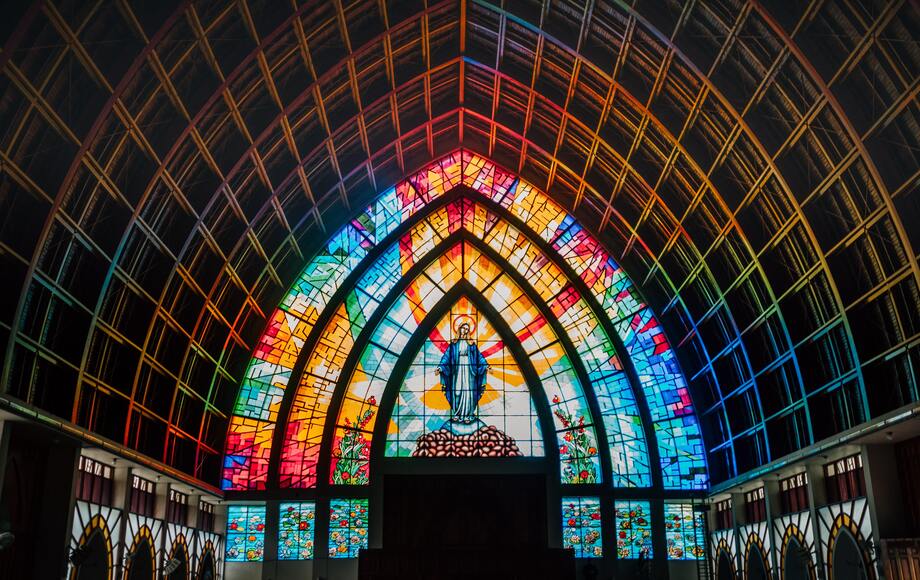– Supernatural Immaculate Conception is a dogma of faith proclaimed by Pope Pius IX in the year 1854, in the bull Ineffabilis Deus. In this document the Church officially recognized that the Virgin Mary was preserved from original sin at the moment of her conception, by virtue of the merits of her Son.
Although it took many centuries for the dogma to be declared, the faithful defended the immaculate conception of the Virgin Mary from the beginning of Christian communities. Santa Maria. This is demonstrated by the devotion that many countries of the world feel for this invocation of the Virgin.
Mary Immaculate in the world
The Immaculate Conception is the patroness of Guatemala and all of Central America (NicaraguaBelize, Costa Rica, El Salvador, Honduras and Honduras. Panama), and its patronage also extends to the United States, South Korea and Japan. Bogota, the capital of Colombia, is also under his special protection.
December 8 is a national holiday in many places, such as Chile, Colombia, Nicaragua, Panama, Paraguay, Peru, Portugal and Spain. In addition, in Panama they also celebrate Mother's Day on the day of the Immaculate Conception, a beautiful coincidence in allusion to the Mother of God.
As Abelardo Rivera, Omnes correspondent in Costa Rica, tells us, the feast of the Immaculate Conception is a precept in the country since a few years ago, it was declared by the Episcopal Conference in 2011. In spite of being a precept, since the 90's there is no longer a civil holiday, since these celebrations were eliminated in many Christian festivities, among them also the feast of St. Joseph's Day (March 19).
In Spain, the Immaculate Conception is the patroness of the Infantry of the Army since 1892, although already in the sixteenth century, unofficially, it was considered as such by the military units. The General Staff Corps, the Military Juridical Corps, the Military Chaplains, the Military Pharmacy and the Military Veterinary Service are also considered patronesses of the Virgin. This relationship between the military and the Virgin Mary goes back many years in the history of the country.
The miracle of Empel
On December 7, 1585, the Spanish tercio (today's Infantry) commanded by Francisco Arias de Bobadilla, faced rebels from the Netherlands, led by Admiral Philip of Hohenlohe-Neuenstein. The Spanish soldiers were surrounded by their adversaries and completely lacked food and dry clothes to face the cold weather on the island of Bommel (Netherlands). The Dutch admiral proposed surrender to the Spanish tercios, who refused to capitulate. Faced with such a response, the army of the Netherlands initiated a strategy that would inevitably lead to the defeat of the Spanish: they ordered the opening of the dikes in the area, thus flooding the enemy camp, sweeping away the few provisions that remained.
The Tercio Viejo de Zamora had to seek refuge in the small hill of Empel, the only place that had not been covered by the water of the rivers. While digging the trenches, a soldier discovered a buried wooden board: it was an image of the Virgin Mary to which they built a makeshift altar. Maestre Bobadilla encouraged the soldiers to renew their spirits, since he considered the discovery a sign of divine protection.
That night it was so cold that the waters froze and the Spaniards were able to walk on the ice until they reached the enemy camp and attacked when the Dutch army was not expecting it. The tercio achieved victory at dawn on the 8th. That same day, the Infantry proclaimed the Immaculate Virgin their patron saint.
The Immaculate Conception in the Catholic Church
The Immaculate Conception has been in controversy during the last years, although at the beginning of Christianity the faithful knew how to recognize in the Virgin Mary the special grace that had been granted to her. The Popes have also wanted to join in this special devotion to Mary. Thus, St. John Paul IIIn a catechesis on the Immaculate Conception in 1996, he said: "the dogma of the Immaculate Conception of Mary does not obfuscate, but rather contributes admirably to better highlighting the effects of Christ's redeeming grace on human nature".
Benedict XVI, in 2007, pronounced these words on the feast we celebrate today: "Once again, on this solemn day, the Church points the world to Mary as a sign of sure hope and of the definitive victory of good over evil. She whom we invoke as full of grace reminds us that we are all brothers and sisters and that God is our Creator and our Father. Without him, or worse, against him, we men will never be able to find the path that leads to love, we will never be able to defeat the power of hatred and violence, we will never be able to build a stable peace".
For its part, the Pope FrancisHe said this simple and revealing phrase about this invocation of the Virgin: "The Immaculate Conception is the fruit of God's love that saves the world".









